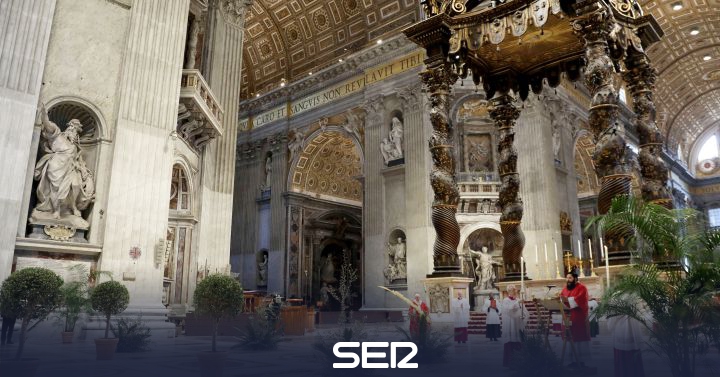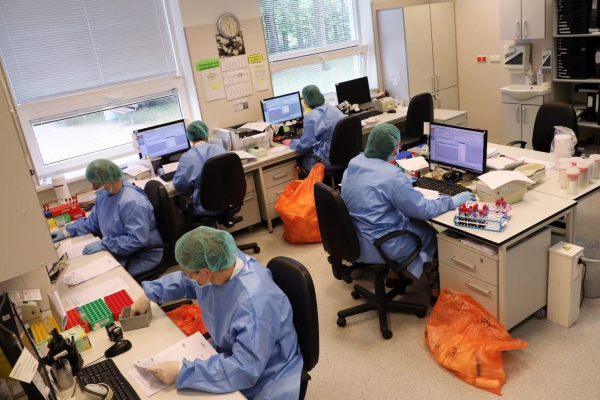Pope Francis has given start the rites of Holy Week with the liturgical celebration of a special Palm Sunday, as it has taken place inside Saint Peter’s Basilica and not in the Vatican Square, as usual, and has not had faithful due to the coronavirus crisis. “The drama that we are going through forces us to take seriously what counts, not to lose ourselves in insignificant things, to rediscover that life is useless, if it is not served. Because life is measured from love. In this way, in home, in these holy days let us stand before the Crucified, who is the measure of the love that God has for us, “Francis said during the homily.
Only a small group of religious accompanied the pope, who at all times respected the safety distance, and the liturgy was celebrated at the altar of the Chair in St. Peter’s Basilica, and not under the canopy. This will be a A particular Holy Week that Francis will celebrate without the faithful and those who want to participate will have to do so from their homes, through the media or social networks. The emergence of the coronavirus, which in Italy has caused more than 15,000 deaths, has forced the Vatican to adopt preventive measures to avoid contagion and already in March it was decided to close the square and the Vatican basilica temporarily.
On March 27, Jorge Bergoglio gave a historic blessing ‘Urbi et Orbi’ –to the city and the world– from a Saint Peter’s Square in the Vatican completely empty of the faithful, and that image has been repeated this Palm Sunday. That day, the image of the Virgin Salus Populi Romani, which is usually kept in the Basilica of Santa Maria Maggiore, and the crucified Christ from the Church of San Marcello, were brought to the Vatican, and both were placed today on the altar, they have already become the symbol of the pope’s prayer to ask for this pandemic to be eradicated. The interior of the basilica was also decorated with some olive trees and palms.
The pope gave a homily in which he asked people to avoid feeling lonely and to hold on to faith in these difficult times. “When we feel between a rock and a hard place, when we find ourselves in a dead end, without light and without escape, when it seems that not even God responds, let us remember that we are not alone,” he said. “Today, in the drama of the pandemic, in the face of so many certainties that crumble, in the face of so many expectations betrayed, with the feeling of abandonment that oppresses our hearts, Jesus says to each of us: ‘Courage, open your heart to my love You will feel the consolation of God, who sustains you ‘”, he added.
Francis asked the faithful around the world to contact the one who suffers, “the one who is alone and in need.” And he sent a message to the younger ones: “Look at the true heroes that come to light these days. They are not those who have fame, money and success, but are those who give themselves to serve others. “He also recalled before the Angelus prayer that it was planned this Sunday that the young people of Panama will deliver the Cross of the Day World Youth Championship to those in Lisbon, but it will be on November 22. Until then, he encouraged young people to cultivate generosity and solidarity.
This year’s will be a different Easter. The Chrism Mass on Holy Thursday in which the holy oils that will serve throughout the year to impart the sacraments have been canceled. Francisco will officiate Mass on Maundy Thursday but not the traditional foot washing that he used to do in migrant reception centers or in prisons. There will also be a mass on Good Friday, as the day before inside the Basilica, but the Via Crucis will be celebrated in St. Peter’s Square and not in the Colosseum, where it has been held uninterruptedly since 1964. Nor will there be any faithful at the Vigil Easter on Saturday or at the Resurrection Mass on Sunday, after which Francis will impart the blessing ‘Urbi et Orbi’.
A faithful sees a mass officiated by Pope Francis on TV / Getty Images
Masses without worshipers and virtual processions
The traditional Palm Sunday of 2020 will be marked forever by the coronavirus pandemic, which has forced the few celebrations that have been possible to carry out behind closed doors, without faithful or Nazarenes, and with the steps also confined in their respective religious “houses”. This time it was not bad weather or rain to blame, but a virus that has the whole world in check, which is why devotees and religious have had to contrive to, at least, be able to celebrate this atypical Palm Sunday.
As in Andalusia, where Holy Week is lived with authentic passion and fervor, they have today held the most austere celebrations, but without fleeing from the essence of a festival that every year usually brings together thousands of faithful around the endless processions and liturgical acts.
In SevillaFor example, there are no processions, except for some virtual ones, nor Nazarenes through its empty streets, nor the usual crowds in churches and cathedrals, whose rites have been officiated behind closed doors and followed by the faithful on television, internet and social networks. The Sevillian archbishop, Juan José Asenjo, stressed that this Palm Sunday “we celebrate an extremely austere Eucharist, without music, without songs, without incense, without faithful, but with the same fervor as if we celebrated it in our Cathedral.” In Malaga, the brotherhood that opens Holy Week every year, the Pollinica, has offered a virtual processional parade on social networks in which, minute by minute, it has recounted the passing of the thrones of its holders through the streets. In Huelva, the four brotherhoods that should have left have also relied on the networks to remember the day of their penance station, just as the brotherhoods of Cádiz and Córdoba have done, which virtually expose the itineraries of the brotherhoods that They should have processed.
In Granada, the gate of the parish of San Andrés Apóstol, from where every Palm Sunday leaves the “Borriquilla” that inaugurates the Semana Mayor, has remained closed; and in Almería and Jaén they have also celebrated Palm Sunday with a “strange feeling” due to the absence of crowds in the streets and in their temples. In Elche (Alicante), the city of palm trees, it has also transferred its traditional procession, declared a Festival of International Tourist Interest since 1997, to the balconies, terraces and windows adorned with white palm trees made in homes during these days of confinement.
The suspension of Holy Week has not made a dent in the spirit of the residents, who at 12 noon have returned to this appointment from their homes, many with white palms in hand, but not the ones that the artisans make every year Ilicitanos, but those created with paper or cardboard by young and old, who have also flooded social networks to show the symbolism of this tradition.
In Pontevedra, the religious community has not stood idly by and has used symbolic celebrations and new technologies so that the city does not run out of its traditional Palm Sunday blessing. At nine o’clock in the morning, Father Alberto Domínguez, with a protective mask in his mouth, appeared at the balustrade of the San Francisco convent to officiate the Eucharist on a Palm Sunday in which the Archbishop of Santiago, Julián Barrio, also asked by all in the church of San Fructuoso, replaced by the cathedral that presides over the Plaza del Obradoiro.
This blessing from a distance has been repeated in another of the most emblematic parishes of Pontevedra, that of Santa María. After the ringing of the bells and the prayer of the Angelus, the titular priest, Javier Porro, has climbed to the top of the bell tower, which can be seen from half the city, to bless the palms and bouquets on the balconies. In addition, for those who have preferred to attend mass, even if it was virtually, the priest Casimiro Fernández, from the parish of San José, has broadcast this celebration from his home through Facebook, as he does with the daily masses since it began. the quarantine turning the homes of its faithful into authentic domestic churches.
In Ourense, the rector Yerai Fariñas has officiated the Palm Sunday Mass behind closed doors in the Os Gozos Sanctuary, while the Archbishop of Pamplona and Bishop of Tudela, Francisco Pérez, has done the same in the Cathedral of the Navarran capital before a small number of priests, deacons, acolytes and very few faithful.
–


